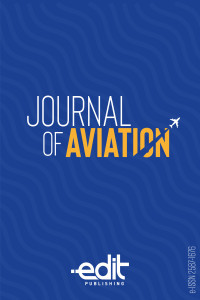The Aviation Sector from a Work Psychological Perspective: A Bibliometric Analysis of Graduate-Level Theses Written in Türkiye
Anahtar Kelimeler:
Aviation, National Thesis Center, Work Psychology
The Aviation Sector from a Work Psychological Perspective: A Bibliometric Analysis of Graduate-Level Theses Written in Türkiye
When aviation studies from past to present are examined, it has been observed that human- oriented studies have increased gradually after it was determined that airplane accidents are caused by human error rather than technical problems. Because work psychology is a discipline that examines the attitudes and behaviors of employees in work life, includes issues related to the improvement of current working conditions and the correction of negative conditions, and will contribute to the minimization of human errors, this research will examine the theses written within the scope of work psychology in the aviation sector by excluding the technical parts in the aviation field. For this purpose, in the National Thesis Center of the Council of Higher Education in Türkiye, between 2003 and 2023, some keywords related to the field were searched and it was determined in which years, on which subjects, where, about whom the research was conducted, and which type of research was used. As a result of the analysis, it has been determined that there has been a great interest in “human”-oriented studies in aviation in Türkiye in the last 20 years, but the number of theses has increased more than in the past after 2019, mostly in Beykent, Anadolu and Gelişim universities and social sciences institutes, and in business and civil aviation management departments, using quantitative research methods. Moreover, “organizational commitment”, “stress”, “burnout”, “communication” and “safety management” subjects were mostly studied at the master's level and “performance”, “organizational commitment”, “personality”, “competence” and “management style” were mostly studied at the doctoral level and the most studied sample group types were employees in the aviation sector generally as well as pilots.
Keywords:
Aviation, National Thesis Center, Work Psychology,
___
- Air Transport Action Group (ATAG), 2023, Employment, Retrieved from https://aviationbenefits.org/economic-growth/supporting-employment/, 17 January 2023.
- Birsel, M. (2022) Havacılık Psikolojisi: Kapsamı ve Havacılık Psikologlarının Sorumlulukları. In Havacılık Psikolojisi: Kavramlar, Araştırmalar, Uygulamalar. (Edt.Pınar Ünsal ve Seda Çeken). İstanbul Üniversitesi Yayınevi, İstanbul. 1-33.
- Høyland, K. & Aase, K. (2009) Does Change Challenge Safety? Complexity in the Civil Aviation Transport System. In Safety, Reliability and Risk Analysis: Theory, Methods and Applications. (Edt. Sebastian Martorell, Carlos Guedes Soares, Julie Barnett). Taylor & Francis Group, London.
- Janic, M. (2000). An Assessment of Risk and Safety in Civil Aviation. Journal of Air Transport Management, 6(1), 43-50.
- Jonge, J. & Kompier, M.A.J. (1997). A Critical Examination of the Demand-Control-Support Model from a Work Psychological Perspective. International Journal of Stress Management, 4(4), 235-258.
- Kümbül Güler, B. (2015). Geçmişten Günümüze Çalışma Psikolojisi. Karatahta İş Yazıları, 3, 1-25.
- Macit, D. ve Macit, A. (2017). Türkiye’de Sivil Havacılık Sektöründe İstihdamın Mevcut Durumu, Sorunları ve Sorunların Çözümüne Yönelik Öneriler. Journal of Emerging Economies and Policy,2(2), 74-85.
- Rezchikov, A., Dolinia, O., Kushnikov, V., Ivaschenko, V., Kachur, K., Bogomolov, A. & Filimonyuk, Y (2016). The Problem of a Human Factor in Aviation Transport Systems. Indian Journal of Science and Technology, 9(46),1-6.
- SHGM, (2021). Sivil Havacılık Genel Müdürlüğü Faaliyet Raporu 2021, Retrieved from https://web.shgm.gov.tr/documents/sivilhavacilik/files/kurumsal/faaliyet/2021.pdf, 18 January 2023.
- Sun, M. (2019). Sivil Havacılık Sektörünün Tarihsel Gelişimi ve Ekonomik Krizlerin Havacılık Sektörüne Etkileri, Tokat Gaziosmanpaşa Üniversitesi, Sosyal Bilimler Enstitüsü, Yüksek Lisans Tezi.
- Taşçıoğlu, C. (2018) Çalışma Psikolojisi. Journal of Economy Culture and Society, 57, 275-279.
- Taşlıgil, N. (1997). Türkiye’de Hava Ulaşımının Gelişimi. Öneri Dergisi, 2(7), 89–97.
- Terzioğlu, M. (2010). Ekip Kaynak Yönetimi (Crew Resource Management), Cinius Yayınları, Birinci Baskı, İstanbul.
- Tsiotas, D., Erdem, U.& Cubukcu, K.M. (2020). Outlining the historical framework of the aviation sector in Turkey: A spatiotemporal approach. Regional Statistics, 10(2), 117–141.
- Wiegmann, D.A. & Shappell, S.A., (2001). A Human Error Analysis of Commercial Aviation Accidents Using the Human Factors Analysis and Classification System (HFACS), Final Report, Office of Aviation Medicine Washington D.C. 20591.
- Yayın Aralığı: Yılda 3 Sayı
- Başlangıç: 2017
- Yayıncı: Vedat Veli ÇAY
Sayıdaki Diğer Makaleler
Oğuzcan KURŞUNCU, Nisa SEÇİLMİŞ
Pandemi Döneminin Türkiye’deki Havayolu Pilotlarının Performansına Etkisi
Çakır Atılhan GÜZEL, Nuran KARAAĞAOĞLU
Relationship Between Wingspan and Fuselage Length in Aircraft According to Engine Types
Çiğdem BOYACILAR ÇAĞLAR, Abdullah TÜRK
Bekir Alper YILDIRIM, Deniz ELBER BÖRÜ
A Demographic Research on Compassion Fatigue and Job Satisfaction Levels of Aviation Employees
